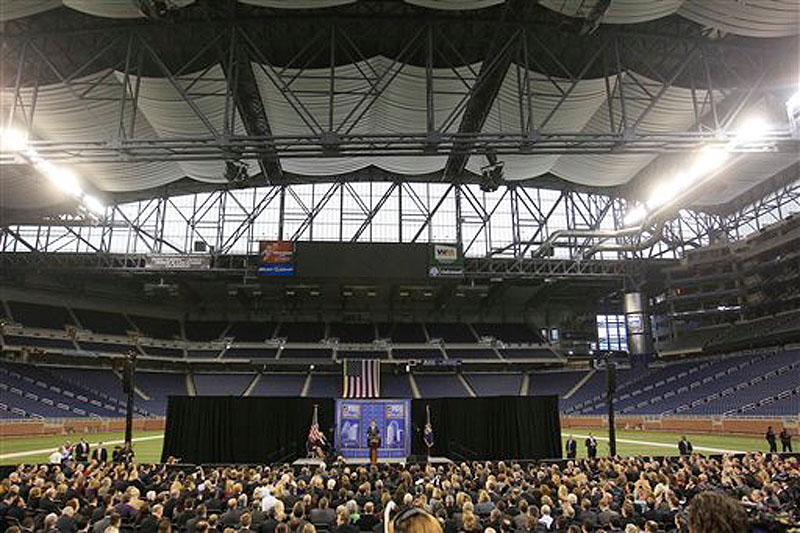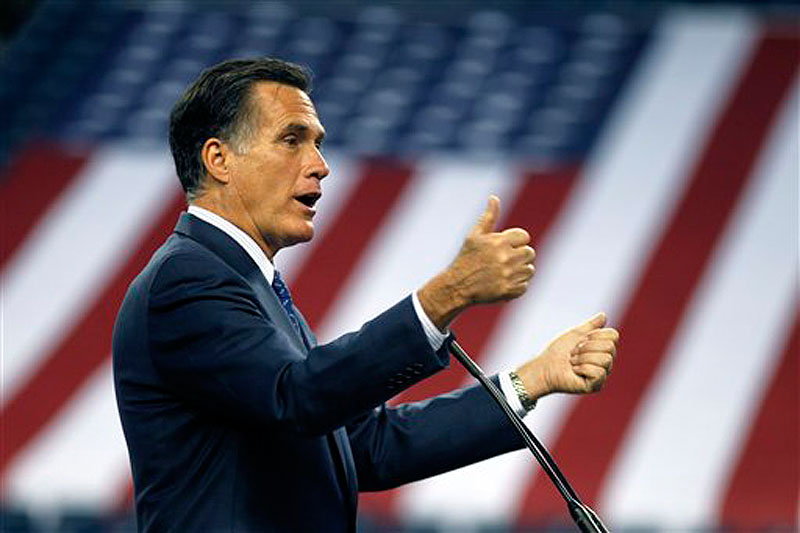DETROIT — Four days before critical primary elections, Republican presidential contender Mitt Romney outlined a far-reaching plan Friday to gradually delay Americans’ eligibility for Medicare as well as Social Security.
Romney said the shift, as people live longer, is needed to steer the giant benefit programs toward economic sustainability.
Speaking to the Detroit Economic Club — in cavernous Ford Field, where the Detroit Lions football team plays — he also made a play for primary election support in Michigan, which votes on Tuesday along with Arizona.
Romney said previous steps to toughen government emission standards had “provided a benefit to some of the foreign automakers” at the expense of American companies. He said future changes should be worked out cooperatively between government and industry.
Campaigning in the city where he was born, Romney described himself as “a car guy” who has a Ford Mustang and a Chevy pickup and whose wife, Ann, drives “a couple of Cadillacs.” Aides said they were model year 2007 and 2010 SRX vehicles, one each registered in Massachusetts and California.
Romney said his proposals for Medicare and Social Security would begin in 2022, meaning no current or near-retirees would be affected. He also said he favors adjustments to curtail the growth of future benefits for the relatively well-to-do, so “lower-income seniors would receive the most generous benefits.” He had described his Social Security proposals previously.
The two programs provide retirement and health care benefits to tens of millions of older Americans.
Beginning in 2022, Romney said, “we will gradually increase the Medicare eligibility age by one month each year. In the long run, the eligibility ages for both programs will be indexed to longevity so that they increase only as fast as life expectancy.”
Under current law, the age for collecting full Social Security benefits is gradually rising from 65 to 67. Medicare is available at age 65. In both cases, the age is set in law, and Romney’s suggestion that it be tied automatically to increases in the life expectancy of Americans would mark a major change.
He spoke in the run-up to a pair of primaries that mark his latest tests as he tries to break free of Rick Santorum and his other persistent but underfunded rivals in the presidential race.
He is widely expected to win Arizona. Neither he nor his rivals is airing television ads in the state, a reliable sign that all sides view it as a closed case.
Although public and private polls in Michigan show Romney has erased much or all of an earlier deficit, he still faces a stiff challenge from Santorum in the state, where the disparity in television advertising is not as overwhelmingly in Romney’s favor has it has been elsewhere.
It is an unwritten rule of Michigan politics that presidential candidates appear before the Detroit Economic Club. Santorum addressed the group several days ago, and officials familiar with the details said Newt Gingrich’s camp had been in discussions for an appearance as late as last week. A spokesman for the former House speaker did not respond to a request for comment.
Romney’s commitment caused a spike in interest, and as a result, the former governor spoke in the huge stadium. He stood on a makeshift stage set up on the 35-yard line, with his audience on the stadium floor ringed by thousands of empty stadium seats. Goalpost uprights were visible above the black draping that served as his backdrop. United Auto Workers protested outside.
The event’s optics were widely criticized. When asked who chose the venue, Romney’s campaign pointed to a letter from the Detroit Economic Club citing the 1,200-person crowd. The club blamed security concerns for moving the event from an atrium inside the stadium complex down onto the field. The Secret Service provides Romney’s security.
Later Friday, Romney campaigned deep into more conservative western Michigan, headlining a rally at Western Michigan University in Kalamazoo after stopping at a restaurant in Mount Clemens.
Santorum, meanwhile, intensified his effort to score an upset on what amounts to Romney’s political home field.
The former Pennsylvania senator greeted parishioners Friday at a packed Catholic Church fish-fry dinner in Walled Lake, Mich., and then spoke for 55 minutes to a small crowd in the Detroit suburb of Lincoln Park.
Santorum said Romney’s plan to limit tax deductions for charitable gifts by high-income people would hurt churches and civic groups. He called for sharp cuts in federal spending and regulations, and new restrictions on government entitlement programs that he said make Americans dependent on government. These were parts of his “economic freedom agenda,” which he plans to enact in his first 100 days in office.
By contrast, Romney rarely strays from economic issues as he presses his case that as a former businessman he is best equipped to help restore an economy still recovering from the worst recession in decades.
“I not only think I have the best chance. I think I have the only chance” of defeating Obama, Romney told his midday audience, although he quickly added with a nervous-sounding laugh, “Maybe I’m overstating it a bit.”
While aides earlier had touted the speech as a major economic address, Romney seemed to pre-empt himself earlier in the week when he called for across-the-board income tax cuts of 20 percent to help the economy grow and begin creating jobs in large numbers.
He repeated that proposal, along with his calls to cut the corporate income tax rate and abolish the estate tax.
On Medicare, Romney also supports changing the program to give beneficiaries a choice between the traditional setup and one in which the government provides them with a monthly payment that can be used to purchase private coverage.
“With these commonsense changes, we will have fixed our balance sheet,” Romney said. “Instead of $62 trillion in unfunded commitments hanging over America’s future, we’ll have a balance sheet that is actually in balance.”
In all there are 30 Republican National Convention delegates at stake in Michigan next week, 29 in Arizona.
Copy the Story Link
Send questions/comments to the editors.




Success. Please wait for the page to reload. If the page does not reload within 5 seconds, please refresh the page.
Enter your email and password to access comments.
Hi, to comment on stories you must . This profile is in addition to your subscription and website login.
Already have a commenting profile? .
Invalid username/password.
Please check your email to confirm and complete your registration.
Only subscribers are eligible to post comments. Please subscribe or login first for digital access. Here’s why.
Use the form below to reset your password. When you've submitted your account email, we will send an email with a reset code.